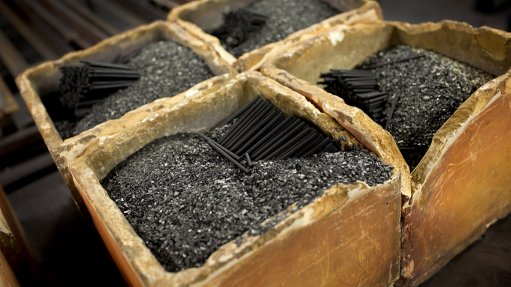
INITIAL FOCUS
Kibaran Resource plans to accelerate the commercialisation of battery graphite production operations during 2018
Photo by: Bloomberg
Following the successful completion of a feasibility study on the downstream processing of graphite from its Epanko graphite project, in Tanzania, exploration company Kibaran Resources will establish a pilot plant in Germany that will be expanded to commercial scale for the supply of premium battery graphite to customers in Europe and Asia.
“The success of the feasibility work and the development of the new processing technology provide Kibaran with an exciting opportunity to generate significant additional value for shareholders,” Kibaran reported earlier this month.
Consequently, the company plans to accelerate the commercialisation of battery graphite production operations during 2018, focusing on the establishment of a modular pilot plant with an initial capability of producing 600 t/y of unpurified battery-grade graphite by the end of 2018.
The pilot plant will then be used in the ramp- up of throughput rates to 20 000 t/y.
Together with the sale of graphite concentrate from Epanko, this will enable Kibaran to supply the full range of graphite products.
The feasibility study, started early this year and led by GR Engineering, with the participation of ProGraphite, found that production of battery-grade graphite using Kibaran’s proprietary nonhydrofluoric acid purification technology delivers environmentally superior battery products at a highly competitive cost.
Kibaran reported that the decision to increase the production rate in the study was based on “strong customer feedback on Kibaran’s eco-friendly processing route and the anticipated 300% to 400% growth in demand (from Japan and Korea alone) from the battery sector from 2020”. According to Kibaran, Japanese and Korean demand growth alone is expected to reach about 120 000 t/y by 2025.
Further, the assessment of product samples met specifications at leading battery anode manufacturers for markets in Japan, Korea, China, Germany and the US.
The study found that the initial investment would be $66-million, which would lead to a pretax net present value of $145-million, an internal rate of return of 34.3% and yearly earnings before interest, taxes, depreciation and amortisation of $30.5-million.
The battery graphite investment has a payback period of about three years.
The initial expenditure requirements for the pilot plant will be funded through available working capital with a boost from a research and development rebate.
“The results of the feasibility study have exceeded our expectations and I thank GR Engineering and ProGraphite for their dedication and commitment to complete this programme over the course of 2017. Kibaran is now positioned to commercialise its battery graphite processing plans, commencing with a downstream processing pilot plant early next year, and I look forward to updating our shareholders as we progress with this exciting addition to our graphite business,” Kibaran MD Andrew Spinks noted in a press statement.
Prices for battery graphite products have increased significantly this year, with recent pricing for standard-grade graphite increasing from $2 300/t to $3 500/t.